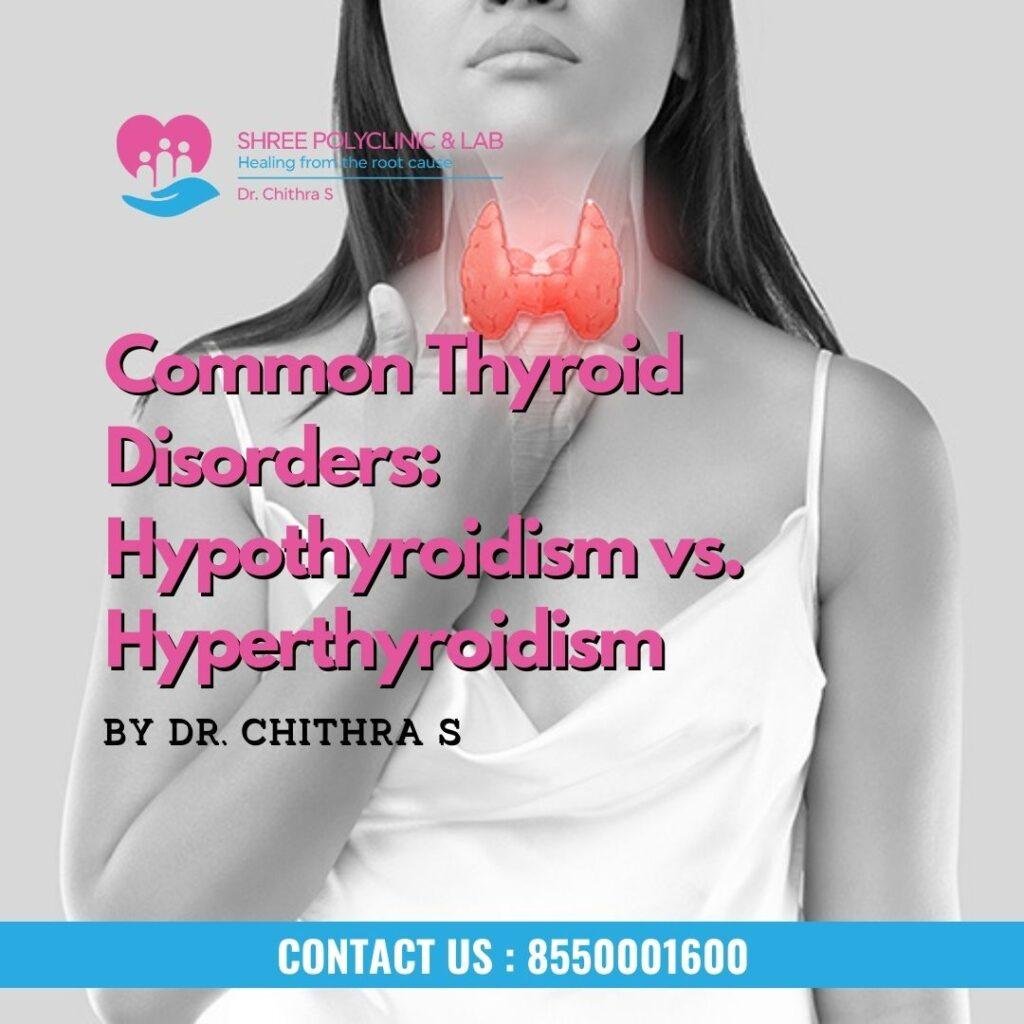The thyroid gland, a small butterfly-shaped organ in the neck, plays a vital role in regulating metabolism, energy levels, and overall body function. When the thyroid doesn’t function properly, it can lead to various health issues, the most common being hypothyroidism and hyperthyroidism. Understanding these conditions can help in early detection and effective management.
What is Hypothyroidism?
Hypothyroidism occurs when the thyroid gland does not produce enough thyroid hormones, leading to a slow metabolism. It is more common in women and can develop gradually over time.
Causes of Hypothyroidism:
- Hashimoto’s Thyroiditis: An autoimmune disease where the immune system attacks the thyroid.
- Iodine Deficiency: Iodine is essential for thyroid hormone production.
- Post-Thyroid Surgery or Radiation Treatment: Treatments for thyroid cancer or goiter may reduce hormone production.
- Certain Medications: Some drugs, like lithium, can affect thyroid function.
Symptoms of Hypothyroidism:
✅ Fatigue and weakness
✅ Weight gain despite normal eating habits
✅ Cold intolerance
✅ Dry skin and hair thinning
✅ Slow heart rate
✅ Depression and brain fog
✅ Constipation
Treatment for Hypothyroidism:
The primary treatment is thyroid hormone replacement therapy using levothyroxine, a synthetic hormone that restores normal thyroid levels. Regular monitoring is essential to ensure proper dosage.
What is Hyperthyroidism?
Hyperthyroidism is the opposite of hypothyroidism—it occurs when the thyroid produces too much thyroid hormone, causing an overactive metabolism.
Causes of Hyperthyroidism:
- Graves’ Disease: An autoimmune disorder that leads to excessive thyroid hormone production.
- Thyroid Nodules: Abnormal growths in the thyroid that increase hormone secretion.
- Excess Iodine Intake: Certain medications or excessive iodine consumption can lead to overactivity.
Symptoms of Hyperthyroidism:
✅ Rapid or irregular heartbeat
✅ Unexplained weight loss
✅ Nervousness, anxiety, or irritability
✅ Excessive sweating and heat intolerance
✅ Tremors (shaking hands or fingers)
✅ Increased bowel movements
✅ Bulging eyes (in Graves’ disease)
Treatment for Hyperthyroidism:
Treatment options depend on the severity and underlying cause:
- Anti-thyroid medications (Methimazole, Propylthiouracil) to reduce hormone production.
- Radioactive iodine therapy to shrink the thyroid gland.
- Beta-blockers to manage symptoms like rapid heartbeat.
- Surgery (thyroidectomy) in severe cases.
Key Differences: Hypothyroidism vs. Hyperthyroidism
| Feature | Hypothyroidism (Underactive) | Hyperthyroidism (Overactive) |
|---|---|---|
| Hormone Levels | Low thyroid hormone | High thyroid hormone |
| Metabolism | Slow | Fast |
| Weight Changes | Weight gain | Weight loss |
| Energy Levels | Fatigue, sluggishness | Restlessness, hyperactivity |
| Heart Rate | Slow | Fast, irregular |
| Temperature Sensitivity | Cold intolerance | Heat intolerance |
When to See a Doctor?
If you experience any of the symptoms mentioned, it is essential to get a thyroid function test (TFT), which measures TSH, T3, and T4 levels. Early diagnosis and proper treatment can prevent complications and improve quality of life.
Conclusion
Both hypothyroidism and hyperthyroidism can impact overall health, but with proper medical care and lifestyle changes, they can be managed effectively. A balanced diet, regular check-ups, and medication adherence are key to maintaining a healthy thyroid.
If you suspect a thyroid problem, consult a healthcare provider for proper diagnosis and treatment. Your thyroid health plays a crucial role in your overall well-being!

